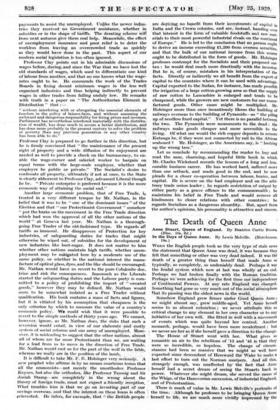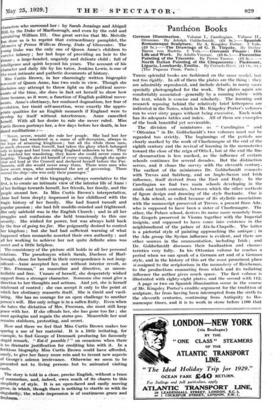The Death of Queen Anne
Anne Stuart, Queen of England. By Beatrice Curtis' Brown.
In the Days of Queen Anne. By Lewis Melville. (Hutchinson.
WHEN the English people took as the very type Of stale news the Statement that 'Queen Anne was dead, it was because they felt that tOniething or other was very dead indeed. It was the death of .ra greater thing than herself that 'made Anne so
typically, so completely, so undeniably dead. Perhaps it was the feudal system which now at last was wholly at an end. Perhaps we had broken finally with the Roman tradition. PerhapS We'Were achieving for the first tune our independence of COntinental Powers. At any rate England was changed. Something hool gone so very much out of the social atmosphere that its passing was the oldest news in the world. . SOmehOw England grew firmer under GOod Queen Anne ;
we might almost say; grevi- middle-aged. Yet Anne herself seems to us almost eolonrless- ; we never attribute this so critical change to any element in her own character or to any • • . • initiative of her own will. She fitted in well with a movement
of events which was quite beyond her Control. Another monarch; *perhaps, would have been more recalcitrant ; but we never see her as if she herself gave a direction to the change.
The Houk of Stuart went with her. What gives so romantic an air to the rebellions of '15 and- '45 is that they were so incredible, so hopeless. The change of circum- stances had been so massive that we might as well have expected some descendant-4)f Here*ard the Wake to make last • effort to turn out the Norman niaripers. • And all this, strangely enough, was unaffected by the fact that Anne herself had a secret dream of seeing the Stuarts back in power. Whatever she might dream, -she served the cause of the Whigs, of the Hanoverian succession, of industrial England, and of Protestantism. - - There is much of value in Mr. Lewis Melville's portraits of the time; --Although he professes to be bringing Queen Anne herself to life, we are much more vividly impressed by the waders who surround her : by Sarah Jennings and Abigail ii by the Duke of Marlborough, and even by the cold and misting William III. One great service that Mr. Melville las done us is to reprint that extraordinary pamphlet, the 'noire of Prince Wiliicnt Henry, Duke of Gloucester. The 'mug Duke was the only one of Queen Anne's children to urvive infancy ; her last hope of providing an heir to the hrone ; a large-headed, ungainly and delicate child ; full of ntelligenee and spirit beyond his years. The account of his haracter and daily life by his tutor, Jenkins Lewis, is one of e most intimate and pathetic documents of history.
Miss Curtis Brown, in her charmingly written biographie moires of Queen Anne, has two ends in view. Though she isclaims any attempt to throw light on the political move- ents of the time,- she does in fact set herself to show how e became, as it were, a function of English political move- ents. Anne's obstinacy; her confused dogmatism, her fear of volution, her timid self-assertion, were exactly the appro- nate qualities for an English monarch if England were to eyelop by itself without interference. Anne cancelled
erself. With all her desire to rule she never ruled. Miss urtis Brown portrays her, a few days before her death, in her meditations :—
Never, never, .would she rule her people. She 'had' lost her ay. She had wandered in a maze of self-deception, always in he hope of attaining kingliness ; but all the while these men, ao much cleverer than herself, had taken the glory which belonged only to kings and had been ruling England unknown to her. They 1 ad watched her wandering, they knew she could never come to 1; y: hip. Though she rid herself of every enemy, though she spoke clear and loud at the Council and declared herself before the Par- liaments, still she would never sway them. There were men who knew secret. _ways, who understood the art of governing. These steered the ship—she was only their passenger."
The other aim of this biography, always correlative to the first, is to create an intimate view of the interior life of Anne ; of her feelings towards herself, her friends, her family, and the people around her. In Miss Curtis Brown's interpretation,
Anne had been deeply impressed in her childhood with the
tragic history of her family. She had feared tumult and pular passion ; she had felt muddle-minded and frightened. er only safehold was in the English Church ; and in all her niggles and confusions she held tenaciously to this one security. She wished for power, but was always held back by the fear of going too far. She poignantly desired to control
her kingdom ; but she had had sufficient warning of what
happened when monarchs asserted their own authority ; and all her working to achieve her not quite definite aims was secret and a little helpless.
The consistency of the picture still holds in all her personal relations. The pseudonym which Sarah, Duchess of Marl-
borough, chose for herself in their correspondence is not insig- nificant—Anne accepted her, not without interior revolt, as
" Mrs. Freeman," as masculine and directive, as uncon- trollable and free. Unsure of herself, she desperately wished support from a stronger character. Someone else must give a direction to her thoughts and actions. And yet, she is herself
intolerant of control ; she can accept it only to the point at which her obstinacy reasserts itself. She is timid and vacil- lating. She has no courage for an open challenge to another
person's will. Her only refuge is in a sullen fixity. Even when she hates the dictation of Mrs. Freeman, she must still keep peace with her. If she offends her, she has gone too far ; she must apologize and regain the status quo. Meanwhile her soul
remains stubborn, protesting, and secret.
Here and there we feel that Miss Curtis Brown makes too sparing a use of her material. It is a little irritating, for example, to find George of Denmark producing his famously stupid remark, " Est-il possible ? " on occasions when there
is no dramatic justification for crediting him with it. In a fictitious biography Miss Curtis Brown could have afforded, surely, to give her fancy more rein and to invent new aspects of George's solemn irrelevance. Otherwise we seem to be presented not to living persons but to animated visiting cards.
The story is told in a clear, precise English, without a trace Of mannerism, and, Indeed, owes much of its charm to this simplicity of style. It is an open-faced and easily moving
Prose,. in which, though there is nothing to startle us with its ungukrity, the whole impression is of continuous grace and frefshneas.









































 Previous page
Previous page